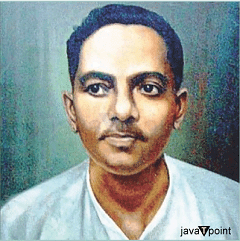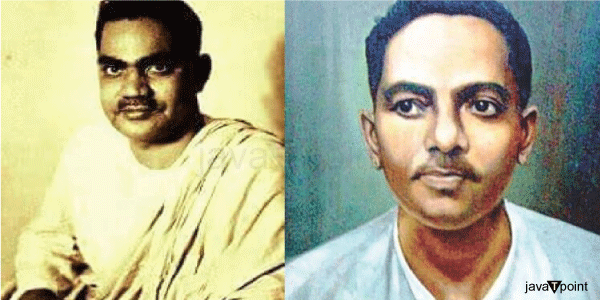Jibanananda Das
IntroductionJibanananda Das, a poet and educator, was born on February 17, 1899, and died on October 22, 1954. His father, Satyananda Das, was an educator, social worker, and founding editor of the Brahmabadi. His mother, Kusumkumari Das, was a poet. Jibanananda Das graduated from Brajamohan School in 1915, earned an IA from Barisal B M College in 1917, a BA Honours Degree in English Literature in 1919, and an MA degree in 1921 from Kolkata's Presidency College. Jibanananda Das began his professional life as a professor of English at Calcutta City College in 1922. Later, from 1929 to 1930, he served as a professor at various institutions, including Bagerhat Profulla Chandra College, Ramjas College in Delhi, Brajamohan College, Barishal College, Howrah Girls College, and Kharagpur College (1950-51). Additionally, he was chosen to serve as the literary editor of the Swaraj and a member of the Dvandra's editorial board, both of which are publications managed by the Samakalin Sahitya Kendra in Calcutta. Jibanananda Das loved to write poems when he was young. His debut poem, Varsa Abahan, appeared in the Brahmabadi in 1919. His initial article was composed in clear Bangla in honor of the late Kalimohan Das. When he first started writing his poetry, Satyendranath Dutta, Mohitlal Majumder, and Kazi Nazrul Islam all impacted him. Jhara Palak's collection of poetry largely demonstrates this impact. In his works, Dhusar Pandulipi (1936), Banalata Sen (1942), Mahaprithivi (1944), Sat-ti Tarar Timir (1948), Bela Abela Kalbela (1980), and Ruposi Bangla (1984), he created a poetic language and style that allowed him to introduce a new category in the growth of contemporary Bangla poetry. His writings have a special individuality because of the beautiful sensuality of beauty, taste, and touch. Jibanananda was one of the poets who tried to balance the lyrical impact of Rabindranath Tagore. This group wrote about the reality of the urban and the lonely despite drawing on rural Bengali traditions. They were influenced by modernism in the West and the Bengali middle class's intellectual outlook. In his early writings, Jibanananda drew inspiration from Kazi Nazrul Islam, Satyendranath Dutta, and Mohitlal Majumder. He overcame these influences, nonetheless, and became a significant figure in Bangla poetry. Jibanananda, referred to as the Rupasi Banglar Kavi (Poet of Beautiful Bengal), shared Rabindranath's ardent love of nature and eloquently expressed the grandeur of rural Bengal in Rupasi Bangla. But unlike Rabindranath, he also conveyed in his poetry the sadness, frustration, and loneliness in modern metropolitan life. His poetic brilliance also includes introspection as a key quality. His poetry combines a feeling of history with a concern for the present. His poetry had a strong influence on later poets, and many of them had a prose-like quality. Jibanananda Das has been referred to as a naturalist poet. His Dhusar Pandulipi is the one-of-a-kind expression of his creative mind, wherein his lyrical imagination has masterfully caught the environment around him, giving nature a greater and more vibrant relevance. Due to his intellect and originality, he escaped all the influences of his time. His poems have a sense of solitude and distance in the setting, suggesting an unfamiliar landscape far from the sky and the world the poet creates in his imagination. His poems have created an alternate reality that one can join but cannot leave. His poetry is based on the idea that everything in life changes and eventually dies. Summary
Love and MarriageA resident and the niece of his uncle, Atulchandra Das, Shovona, fell in love with the young Jibanananda. He made Shovona the topic of his first poetry collection without mentioning her by name. Since it was considered inappropriate for cousins to marry, he chose not to try. In his literary notes, he referred to her as Y. Soon after Labanyaprabha Das (n�e Gupta) and Jibanananda Das were married in 1930, a personality conflict shattered his hopes for a happy marriage. The distance was never filled when he was with his wife. After a tram accident on October 14, 1954, Jibanananda was in critical condition, but Labanyaprabha did not often go to see him on his deathbed. She was working on a movie in Tallyganj at the time. Some of his Well-Known WorksJibanananda's rural Bengali poems greatly impacted Bangladesh's political and cultural orientation. In the 1960s and during the independence war in 1971, his writings sparked pride in Bengali nationhood. Most of Jibanananda's writings were published after his death. Some of the more well-known books include Aloprithivi (1981), Hey Prem Tomarey Bhebe Bhebe (1998), Jibanananda Daser Shreshtha Kavita (1954), Jibananander Kabyasombhar (1985), Prokashito Aprokashito Kavita Samagra (1993), Jibanananda Samagra (1985-1998), and Jibanananda Samagra Songjojan (1999). Kavitar Kotha (1955) is a valuable work (1955) compilation of his essays on poetry writing. Samalochana Samagra, published in 1983 and 1986, is another of his important books. Keno Likhi published an autobiographical essay in 1944. 
Malyaban and Sutirtha, two of Jibanananda Das' well-known works, were published in 1973. These works' ideas were unique, and their writing was outstanding. He published two collections of short stories, the first as Jibanananda Daser Galpa in 1972 and the second as Jibanananda Daser Sreshtha Galpa in 1989, both of which were edited by different people. Between 1985 and 1998, 12 volumes of Debesh Roy's Jibanananda Samagra were published in Calcutta by Pratikshan Publications. Banalata Sen received a prize in 1953 at the Nikhil Banga Rabindra Sahitya Sammelan (All Bengal Rabindra Literature Convention). In 1954, Jibanananda Dasher Shrestha Kavita received the Sahitya Academy Prize. On October 22, 1954, he died in a tram accident in Kolkata. Bengali Poetry by JibananandaAs of 2009, more than 300 million people, mostly in Bangladesh and India, were native Bengalis. Tagore dominated Bengali poetry and literature for almost fifty years, gradually affecting modern writers. Gitanjali, a compilation of Tagore's poems published as Song Offering and translated into English by the poet himself, won the 1913 Nobel Prize for Literature. Bengali literature was gaining popularity then and was being studied by writers worldwide. Bengali poetry has come a long way since then. Dhushar Pandulipi (illustrated by Satyajit Ray) created Signet Edition, which has developed based on its tradition in response to diverse poetry movements worldwide and in various tones, shades, and essences. Contemporaries of JibananandaIn Bengal, attempts to move away from the Tagorian style and worldview began in the first decades of the 20th century. Kazi Nazrul Islam (1899-1966), a poet, became well-known for using patriotic themes with a musical tone and tenor. Beginning around the end of the 19th century and attributed to modern European and American influences, several new-ration poets made an organized effort to blend Bengali poetry with the essence of the global emerging modernism. A post-Tagorian poetic paradigm and modernism were introduced to Bengali poetry by Sudhindranath Dutta (1901-1960), Buddhadeb Bose (1908-1974), Amiya Chakravarty (1901-1986), Jibanananda Das (1899-1954), and Bishnu Dey (1909-1982). These five poets have each received special recognition for their contributions to these movements. Modernism in Bengali poetry of the 20th century was defined by these five pioneers and a few of their followers. The poet Jibanananda Das was the least well-liked throughout his lifetime. He received little attention, and some people considered him challenging to comprehend. Readers and current literary reviewers have also challenged his manner and language. He occasionally received harsh remarks from renowned writers of the day. Even Tagore, who celebrated his poetic skills, made negative comments about his use of language. But a crown was waiting for him from fate. DeathWhen Jibanananda was only 55, a car accident unexpectedly ended his life. He got hit by a tram on October 14, 1954, in Calcutta while crossing a street near Deshapriya Park. Jibanananda had finished his evening walk and was heading back home. He used to live in a rented flat on Lansdowne Road at that time. He was brought to Shambhunath Pundit Hospital after suffering serious injuries. Sajanikanta Das, a poet and writer who had been one of his greatest opponents, worked nonstop to get the poet the best care possible. Even Dr. Bidhan Chandra Roy, West Bengal's chief minister at the time, was convinced to pay him a visit to the hospital. However, the damage was too severe to be fixed. Eight days later, around midnight on October 22, 1954, Jibanananda died at a hospital. He had two children, a son and a daughter, his wife, Labanyaprabha Das, and an expanding fanbase he left behind when he passed away at 55. The next day, his remains were cremated at Keoratola Crematorium. In certain biographical narratives, it has been claimed that his accident was a suicide attempt. His passing was deeply felt in the literary world. Nearly all the publications published tributes that conveyed real praise for Jibanananda's poetry. Sanjay Bhattacharya, a poet, wrote the death announcement and sent it to many newspapers. As reported in The Times of India on November 1, 1954: "Mr. Jibanananda Das' untimely passing following an accident eliminates from the realm of Bengali literature a poet who, despite never enjoying fame and fortune, made a substantial contribution to contemporary Bengali poetry through his prose-poems and free-verse. Jibanananda Das was a diligent observer of life and a poet of nature. He was noted more for his vivid imagination and tangible imagery than for the social allusions in his poems. To a literary world dazzled by Tagore's glory, Das showed how to remain true to the poet's vocation without basking in its reflection."
Next TopicJasmine Sandlas
| ||||||||||||||||||
 For Videos Join Our Youtube Channel: Join Now
For Videos Join Our Youtube Channel: Join Now
Feedback
- Send your Feedback to [email protected]
Help Others, Please Share









